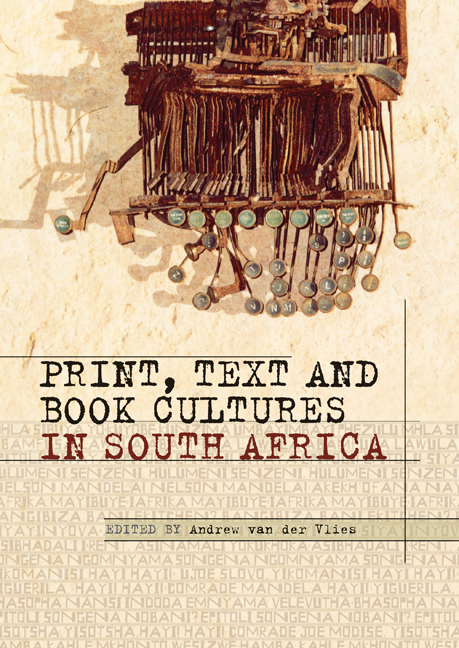Book contents
- Frontmatter
- Contents
- Acknowledgements
- Abbreviations and acronyms
- 1 Introductory
- 2 Print Cultures and Colonial Public Spheres
- 3 Local/Global: South African Writing and Global Imaginaries
- 4 Three Ways of Looking at Coetzee
- 5 Questions of the Archive and the Uses of Books
- 6 Orature, Image, Text
- 7 Ideological Exigencies and the Fates of Books
- 8 New Directions
- 8.1 The Rise of the Surface: Emerging Questions for Reading and Criticism in South Africa
- 8.2 Sailing a Smaller Ship: Publishing Art Books in South Africa
- 8.3 The University as Publisher: Towards a History of South African University Presses
- Contributors
- Index
8.3 The University as Publisher: Towards a History of South African University Presses
from 8 - New Directions
Published online by Cambridge University Press: 21 April 2018
- Frontmatter
- Contents
- Acknowledgements
- Abbreviations and acronyms
- 1 Introductory
- 2 Print Cultures and Colonial Public Spheres
- 3 Local/Global: South African Writing and Global Imaginaries
- 4 Three Ways of Looking at Coetzee
- 5 Questions of the Archive and the Uses of Books
- 6 Orature, Image, Text
- 7 Ideological Exigencies and the Fates of Books
- 8 New Directions
- 8.1 The Rise of the Surface: Emerging Questions for Reading and Criticism in South Africa
- 8.2 Sailing a Smaller Ship: Publishing Art Books in South Africa
- 8.3 The University as Publisher: Towards a History of South African University Presses
- Contributors
- Index
Summary
In South Africa, publishing and print media have been closely connected to the country's history of colonialism and apartheid. And most studies in this area to date have focused on the most explicit links between publishing and apartheid: not so much the question of how apartheid affected publishing, but how publishing houses actively sought either to undermine or support the government and its policies. Thus, most studies—and there are not many in the field of publishing history—tend to look either at the oppositional publishers (such as David Philip, Ravan and Skotaville) or at the establishment publishers, the Afrikaans presses (Nasionale Pers, for instance). University presses fall in the middle—neither clearly anti-apartheid nor neatly collaborationist.
In general, “[t]he history of publishing in [African] countries makes only brief mention of university publishing”, observes K. O. Darko-Ampem (2003, 89), “for the apparent reason that this kind of publishing captures nobody's attention; neither the government nor the private sector”. Very little has been written about the history of scholarly publishing and the university presses in South Africa—indeed, no study has focused on any of the university presses per se. Only a few articles and book chapters, and a chapter of a DPhil thesis touch on aspects of this country's university press publishing (see, for instance Gray 2000; Darko-Ampem 2003; Embewo and other chapters in Ngobeni 2010).
In contrast to such a lack of interest thus far, I would argue that scholarly publishing can tell us a great deal about academic freedom in a constrained society, and thus about the interplay between academia and other, more overtly political, sections of society. In this essay, I suggest why we might be interested in the history of South Africa's university presses, as well as the links and discontinuities between their publishing lists and philosophies, and questions of academic freedom, access to the privilege of publishing and the research communication cycle.
SOUTH AFRICA's UNIVERSITY PRESSES
The purpose of a university press is to publish and disseminate research of significance.
- Type
- Chapter
- Information
- Print, Text and Book Cultures in South Africa , pp. 437 - 448Publisher: Wits University PressPrint publication year: 2012



